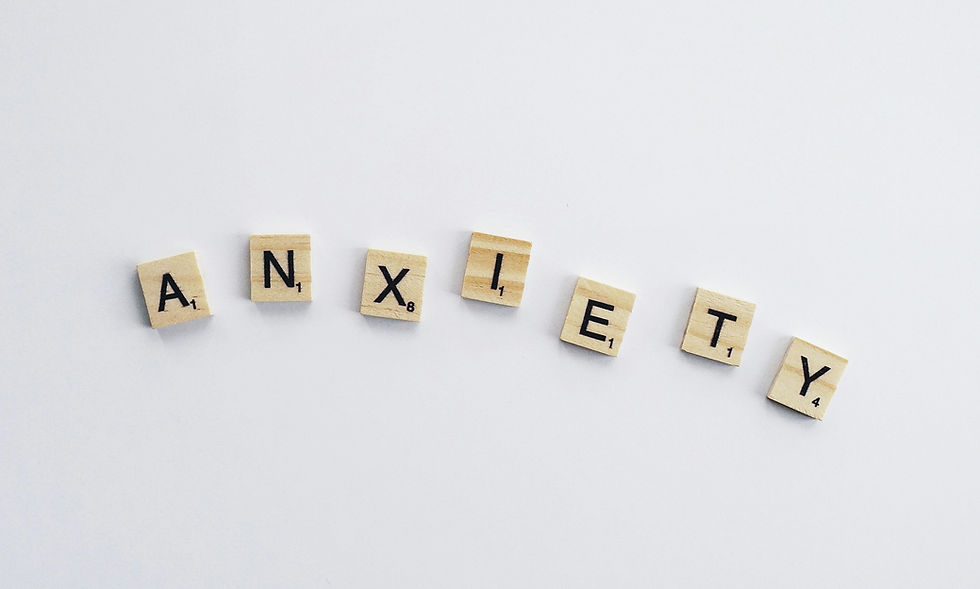Understanding Anxiety: Signs, Causes, and Treatment Options
- Central Clinic
- Nov 28, 2024
- 2 min read
Anxiety is one of the most prevalent mental health conditions worldwide, with the World Health Organization estimating that approximately 264 million people suffer from anxiety globally. In the UK, the situation mirrors these trends. Data from the Mental Health Foundation indicates that in 2021, 8.3 million adults experienced an anxiety disorder at some point, and women were twice as likely to be affected as men.
In Gibraltar alone, the 2021 Health and Lifestyle Survey reported that 32.5% of participants identified anxiety as a prevalent health concern, highlighting its significant impact on the community
Recognizing the Signs of Anxiety
Anxiety can present with a variety of symptoms, including:
Persistent worry, fear, or panic
Difficulty concentrating or making decisions
Sleep disturbances such as insomnia
Physical symptoms like racing heart, muscle tension, headaches, or gastrointestinal issues
Occasional anxiety is a normal response to stress, but when symptoms persist for more than six months or significantly impact daily functioning, professional intervention is recommended.

Causes of Anxiety
Anxiety is typically caused by a combination of factors, including:
Stressful Events: Loss of a loved one, relationship breakdowns, or significant life changes.
Biological Factors: Imbalances in brain chemistry, genetics, or hormonal changes.
Lifestyle: Poor sleep, excessive alcohol or caffeine consumption, and physical inactivity exacerbate anxiety.
COVID-19 Pandemic: Surveys show a sharp increase in anxiety since the onset of the pandemic. In the UK, 62% of adults reported feeling more anxious during the lockdown .
Treatment Options
1. Therapy
Cognitive Behavioral Therapy (CBT): CBT is one of the most effective treatments for anxiety.
Mindfulness-Based Stress Reduction (MBSR): Recommended by the National Institute for Health and Care Excellence (NICE), mindfulness practices are shown to reduce anxiety symptoms.
2. Medications
Antidepressants, such as selective serotonin reuptake inhibitors (SSRIs), are often prescribed. NICE guidelines emphasize combining medication with psychological therapies for long-term efficacy.
3. Lifestyle Interventions
Exercise: The NHS advises at least 150 minutes of moderate-intensity activity weekly, which has proven benefits for reducing anxiety.
Nutrition: A balanced diet rich in omega-3 fatty acids, whole grains, and fresh produce supports brain health and reduces inflammation linked to anxiety.
Sleep: Over 36% of UK adults experiencing anxiety report poor sleep. Regular routines and sleep hygiene practices can help restore balance.

Resources for Gibraltar
Central Clinic Gibraltar provides counseling, mindfulness and therapeutic services.
GHA Talking Therapies: Available through GP referral, offering services like CBT and guided self-help.
Local Charities: Charities, such as Gibsams or Clubhouse provide resources, and helplines.
When to Seek Help
If anxiety disrupts your life or becomes unmanageable, seek help promptly. Early intervention can significantly improve outcomes.
Anxiety is a common yet treatable condition. By recognizing the signs, understanding its causes, and seeking appropriate support, individuals can regain control and lead fulfilling lives. If you or someone you know is struggling, reach out to resources like the GHA or local services for guidance.
#MentalHealthAwareness #AnxietySupport #CentralClinic #Mindfulness #WellnessJourney #Gibraltar #MentalWellnessMatters #YouAreNotAlone
Sources
GHA: Health and Lifestyle Report, 2021
NHS Digital: Mental Health Prevalence in England, 2022
Mental Health Foundation: Stress and Anxiety Statistics, 2021
Centre for Mental Health: Economic Costs of Anxiety, 2021
ONS: Well-being in the UK, 2021






